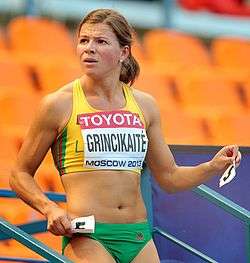Lina Grinčikaitė-Samuolė
Lina Grinčikaitė-Samuolė (born 3 May 1987 in Klaipėda) is a track and field sprint athlete, who competes internationally for Lithuania.[1]
 Lina Grinčikaitė in 2013 IAAF World Championships in Athletics | ||||||||||||||||||||||||||||||||||||||
| Personal information | ||||||||||||||||||||||||||||||||||||||
|---|---|---|---|---|---|---|---|---|---|---|---|---|---|---|---|---|---|---|---|---|---|---|---|---|---|---|---|---|---|---|---|---|---|---|---|---|---|---|
| Nationality | Lithuanian | |||||||||||||||||||||||||||||||||||||
| Born | 3 May 1987 Klaipėda, Lithuania | |||||||||||||||||||||||||||||||||||||
| Sport | ||||||||||||||||||||||||||||||||||||||
| Country | ||||||||||||||||||||||||||||||||||||||
| Sport | Track and field | |||||||||||||||||||||||||||||||||||||
| Event(s) | Sprint | |||||||||||||||||||||||||||||||||||||
| Achievements and titles | ||||||||||||||||||||||||||||||||||||||
| Olympic finals | 2008: SF, 2012:SF | |||||||||||||||||||||||||||||||||||||
| Personal best(s) |
| |||||||||||||||||||||||||||||||||||||
Medal record
| ||||||||||||||||||||||||||||||||||||||
Grinčikaitė represented Lithuania at the 2008 Summer Olympics in Beijing. She competed at the 100 metres sprint and placed third in her first round heat after Chandra Sturrup and Kelly-Ann Baptiste in a time of 11.43 seconds. She qualified for the second round, in which she improved her time to 11.33 seconds and placed second after Torri Edwards. With 11.50 seconds she placed sixth in her semi final race, which meant she was eliminated.[1]
After finishing seventh at the 2009 European Athletics Indoor Championships, Grinčikaitė took the gold medal in the 100 m at the 2009 Summer Universiade, scoring a new personal best of 11.31 seconds in the process.[2] She competed at the 2010 IAAF World Indoor Championships, but was eliminated in the semi-finals of the women's 60 metres.
Personal bests
| Event | Time (sec) | Venue | Date |
|---|---|---|---|
| 60 metres | 7.26 | Istanbul, Turkey | 11 March 2012 |
| 100 metres | 11.19 NR | London, United Kingdom | 3 August 2012 |
| 200 metres | 23.33 | Leiria, Portugal | 22 June 2008 |
- All information taken from IAAF profile.
Achievements
| Year | Competition | Venue | Position | Event | Notes |
|---|---|---|---|---|---|
| Representing | |||||
| 2004 | World Junior Championships | Grosseto, Italy | 8th (sf) | 100m | 11.71 (-0.1 m/s) |
| 2005 | European Indoor Championships | Madrid, Spain | 16th (sf) | 60 m | 7.41 |
| European Junior Championships | Kaunas, Lithuania | 2nd | 100 m | 11.69 | |
| 4th | 200 m | 23.78 | |||
| 6th | 4 × 100 m relay | 45.47 | |||
| 2006 | World Indoor Championships | Moscow, Russia | 18th (sf) | 60 m | 7.38 |
| World Junior Championships | Beijing, China | 6th | 100m | 11.49 (-0.8 m/s) | |
| 4th (h)[3] | 200m | 23.84 (-1.5 m/s) | |||
| 2007 | European Indoor Championships | Birmingham, United Kingdom | 29th (h) | 60 m | 7.47 |
| European U23 Championships | Debrecen, Hungary | 4th | 100m | 11.69 (-2.0 m/s) | |
| 13th (sf) | 200m | 23.73 (-0.6 m/s) | |||
| 10th (h) | 4 × 100 m relay | 45.37 | |||
| 2008 | World Indoor Championships | Valencia, Spain | 21st (sf) | 60 m | 7.41 |
| Olympic Games | Beijing, China | 14th (sf) | 100 m | 11.50 | |
| 2009 | European Indoor Championships | Turin, Italy | 7th | 60 m | 7.38 |
| Universiade | Belgrade, Serbia | 1st | 100 m | 11.31 | |
| 5th | 4 × 100 m relay | 44.48 | |||
| European Athletics U23 Championships | Kaunas, Lithuania | 1st | 100 m | 11.37 (+0.2 m/s) | |
| 3rd | 4 × 100 m relay | 44.09 | |||
| 2010 | World Indoor Championships | Doha, Qatar | 13th (sf) | 60 m | 7.34 |
| European Championships | Barcelona, Spain | 12th (sf) | 100 m | 11.35 | |
| 11th (h) | 4 × 100 m relay | 44.13 | |||
| 2011 | European Indoor Championships | Paris, France | 9th (sf) | 60 m | 7.27 |
| Universiade | Shenzhen, China | 3rd | 100 m | 11.44 | |
| 2012 | World Indoor Championships | Istanbul, Turkey | 12th (sf) | 60 m | 7.26 |
| European Championships | Helsinki, Finland | 3rd | 100 m | 11.32 | |
| Olympic Games | London, United Kingdom | 17th (sf) | 100 m | 11.30 | |
| 2013 | Universiade | Kazan, Russia | 2nd | 100 m | 11.32 |
| 2014 | European Championships | Zürich, Switzerland | 18th (sf) | 100 m | 11.52 |
| 2015 | European Indoor Championships | Prague, Czech Republic | 25th (h) | 60 m | 7.41 |
| Universiade | Gwangju, South Korea | 4th | 100 m | 11.49 | |
| – | 4 × 100 m relay | DNF | |||
| 2016 | European Championships | Amsterdam, Netherlands | 20th (h) | 100 m | 11.77 |
References
- "Athlete biography: Lina Grincikaite". Beijing2008.cn. Archived from the original on 2008-09-10. Retrieved August 28, 2008.
- van Kuijen, Hans (2009-07-09). Gold for Serbian junior Spanovic in Long Jump – World University Games Day 2. IAAF. Retrieved on 2009-07-23.
- Did not show in the semifinal.
External links
- Lina Grinčikaitė-Samuolė at World Athletics
- Lina Grinčikaitė-Samuolė at Olympics at Sports-Reference.com (archived)
| Wikimedia Commons has media related to Lina Grinčikaitė. |